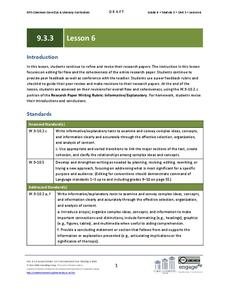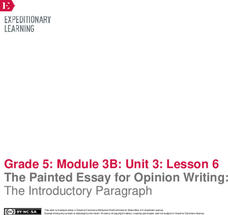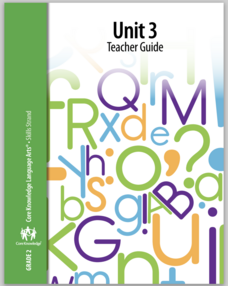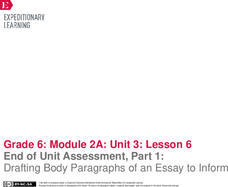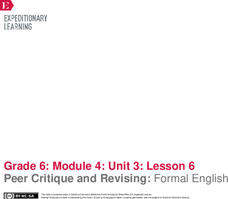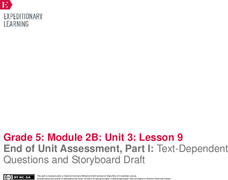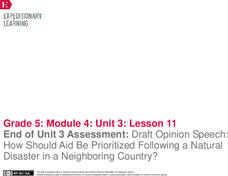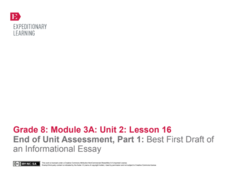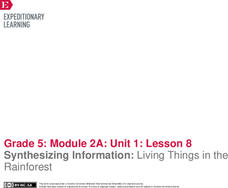EngageNY
Grade 9 ELA Module 3, Unit 3, Lesson 6
The eighth lesson in the editing process focuses on flow and cohesiveness in the entire research paper. Class members examine color-coded pre- and post-revision model paragraphs and then work in pairs to revise and peer-review their papers.
EngageNY
Performance Task Preparation: Peer Critique and Mini-Lesson Addressing Common Errors: Revising Draft Essay to Inform
Time to revise! Using a writing evaluation rubric, scholars participate in a peer editing process to provide feedback on each others' informative essays. Next, pupils begin revising their drafts based on the feedback they receive.
Curated OER
Unit 3: Scientific Writing
Write-on! Demonstrate a writing model and support learners as they write an informational essay on a water resource issue of your (or their) choosing. The lesson plan provides a well-scaffolded summative writing experience that wraps up...
EngageNY
Analyzing the Structure and Content of an Essay to Inform
Outlines are a great asset to essay planning. Scholars read and analyze a model essay about the importance of daily reading and consider how it would look in an outline format. Next, they outline their own informative essays about rules...
EngageNY
The Painted Essay for Opinion Writing: The Introductory Paragraph
The answer is blowin' in the wind. Using the resource, scholars read and analyze a model essay about wind power. Next, they work in groups to write an introductory paragraph that expresses an opinion about the topic.
Core Knowledge Foundation
Unit 7: Anne Frank’s Tales from the Secret Annex Teacher Guide
Frequently banned, often challenged, a mainstay of middle school curriculum, Tales from the Secret Annex, is the featured text in the seventh unit in the Teacher Guide Core Knowledge Program. The 134-page guide includes an introduction,...
Indian River State College
Argumentative (Persuasive) Essay Guidelines
Here is a handout that outlines six great steps to structuring an argumentative essay, which can be continually referenced as you teach your class about persuasive writing.
Core Knowledge Foundation
Unit 5: Geology
Over four weeks, fourth graders participate in a geology-themed unit. Scholars listen to informational texts, discuss readings, and complete word work and grammar lessons. Writing practice includes drafting an informational pamphlet, a...
Core Knowledge Foundation
Second Grade Skills Unit 3: Kids Excel
The unit offers second graders skills practice in tricky spelling and words, grammar—nouns and punctuation, reading decodable texts, and writing a personal narrative. Lessons begin with a warm-up and go into a concept review, word work,...
Core Knowledge Foundation
Unit 8: Native Americans
Over five weeks, fifth graders listen to and discuss reading passages that explore the connection between Native Americans and nature. Following daily readings, scholars practice word work, including prefixes, root words, suffixes,...
Core Knowledge Foundation
Unit 4: Listen, My Children - Poems for Fourth Graders
Over three weeks, fourth graders explore the world of poetry. They listen to authors such as Shel Silverstein and Maya Angelou, complete word work activities, and practice spelling skills. Budding poets take pen to paper with daily...
Curated OER
Nonfiction Genre Mini-Unit: Persuasive Writing
Should primary graders have their own computers? Should animals be kept in captivity? Young writers learn how to develop and support a claim in this short unit on persuasive writing.
EngageNY
End of Unit Assessment, Part 1: Drafting Body Paragraphs of an Essay to Inform
Anybody can write a body paragraph! Pupils analyze the development of ideas in a body paragraph from a model essay. Next, using what they've learned, they draft the body paragraphs of their My Rule to Live By informative essay.
EngageNY
Peer Critique and Revising: Formal English
Dear Sir or Madam: What's the difference between formal and informal language? Scholars focus on using formal English and transitions in their position papers. After revising their rough drafts, they engage in the peer editing process...
EngageNY
Mid-Unit 3 Assessment, Part I: Short Constructed Response and Organizing Notes for a Public Speech
It's time to put pen to paper. Scholars complete the first part of the mid-unit 3 assessment, writing a short constructed response about international aid following a natural disaster. Next, pupils use informational texts and note...
EngageNY
End of Unit Assessment, Part 1: Text-Dependent Questions and Storyboard Draft: “You Can Do a Graphic Novel” Excerpt
Eyes on the finish line. Serving as the first part of the end of unit assessment, learners answer questions based on a text about how to write a graphic novel. Using what they've learned, they then create a storyboard about the invention...
EngageNY
End of Unit 3 Assessment: Draft Opinion Speech: How Should Aid Be Prioritized Following a Natural Disaster in a Neighboring Country?
Put it to the test. With the cumulative resource, pupils complete the End of Unit 3 Assessment. Using everything they've learned in the unit, they write a draft of an opinion speech about how to prioritize aid after a natural disaster.
EngageNY
End of Unit Assessment, Part 1: Best First Draft of an Informational Essay
This is just the beginning. Learners take the first step toward their end-of-unit assessments of Unbroken. They use their tools and knowledge gained from the unit to create first drafts of their informational essays. Writers then respond...
Schoolwires
12th Grade Expository Reading and Writing Research Project
The beauty in this resource is the lengthy list of highly charged, controversial-issue research topics. Categories include issues of race, politics, law, environment, education, athletics, gender, and technology. After selecting a topic,...
EngageNY
Revising the Informative Consumer Guide: Sentence Structure, Transitions, and Works Cited
Transitions are the glue that link paragraphs together. Pupils listen to a mini lesson plan on sentence structure and transitions and use what they learned to revise their informative consumer guides. Next, they self-assess their writing...
EngageNY
Synthesizing Information: Living Things in the Rainforest
How is a map a type of informational text? Class members view a world map of major rainforests, discussing its text features with a partner. Next, they take notes on key details from multiple texts about rainforests and write an...
EngageNY
Analyzing the Features of an Informative Consumer Guide
Analyze, strategize, synthesize! Scholars analyze informative consumer guides to determine what features to include in their own guides. Next, pupils select charts and images to use in their guides.
Core Knowledge Foundation
Light and Sound Tell It Again!™ Read-Aloud Anthology
Light and sound are the running themes of a read-aloud anthology. Over three weeks, third graders listen to discuss readings in preparation for completing extension activities. Pupils work through the writing process to compose an...
Core Knowledge Foundation
Kindergarten Skills Unit 2
Kindergarteners practice prewriting skills in a 10-day unit. Young scholars blend sounds and syllables, build shapes with playdough, write shapes on paper, and trace their names.


